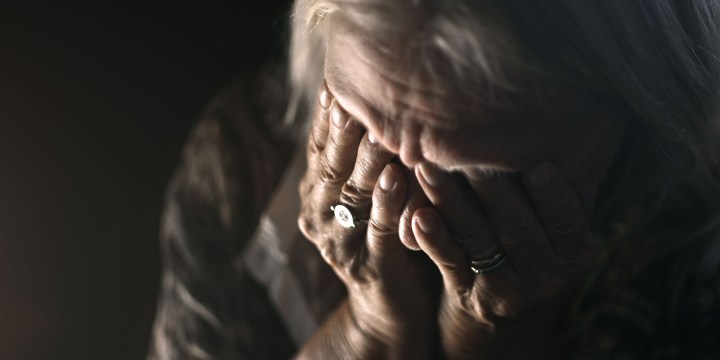OLD AGE SUPPORT OP-ED
Government needs imaginative policies to transform elderly care and ensure dignity for the aged

The government, in collaboration with civil society and older people themselves, should build systems that prioritise social connectedness and dignity in older age.
“Older people are just literally left on their own.”
The distress in Nosiphiwo Tetana’s voice is apparent as she talks about older people isolated at home without care and support. The community centre she manages in Dimbaza, Eastern Cape, is severely underfunded and unable to meet the demand.
Almost three decades since the end of apartheid, South Africa’s laws have come a long way in addressing discriminatory policies of the past. But when it comes to protecting the rights of older people, many are still facing poverty, loneliness and isolation.
It is a legacy of spending at least half their lives under a government whose racial segregation policies displaced many and denied the majority of black African, coloured, and Indian/Asian people a good standard of education, decent work and the ability to save for older age. The cumulative impact of that racial discrimination still affects older people today.
Policymakers have an opportunity to transform care for older people in the years ahead, creating a better future and ensuring that everyone in South Africa receives the care and support they are entitled to.
The first step is for the government to confront realities on the ground. Consider Rose Nduneni’s story.
Rose (70) lives with her 18-year-old grandson, who is at college all day. “I have to stay with the dogs,” she said. “That loneliness kills us.”
Lack of social connection
Rose has tried to join the community centre for older people in Dimbaza since 2021. But insufficient government funding means that the centre has had to turn her away. She said staff told her they “can’t afford any new members”.
Those suffering from loneliness are at risk of depression, cognitive decline and dementia. They don’t sleep well and die earlier.
Social connection and a sense of belonging are critical at every stage of life, especially in older age. Community- and home-based care and support services can help reduce loneliness, build belonging and enable older people to participate and live with dignity in their communities.
Few older people in South Africa have access to such services. Those with access are often limited to a lunch club or a sports or recreational activity. Fewer still get the support to live with dignity in their own homes. Tetana, the manager of the Dimbaza Society for the Aged’s service centre for older people, told us: “Older people are just literally left on their own.”
In the 1960s, the government forcibly removed the family of Marhafungana Silwanyana (75) from Duncan Village to Mdantsane, in the Eastern Cape. He worked at the East London harbour for 40 years before retiring with no workplace pension. Suffering from chest pains and asthma and with no access to nearby community- or home-based services, he sits at home all day. “The days are long and boring,” he said. “I didn’t think my life would be like this.”
Increased isolation also puts older people’s physical safety at risk. A government social worker told us that older people are exposed to various dangers, like gender-based violence, rape and murder when they are isolated and not getting needed home-based care and support.
South Africa’s Older Persons Act, which went into effect in 2010, aims to combat abuse of older people and uphold their right to participate in community life. But there is a disconnect between law and practice.
One size fits all
The government’s current targets are based on available budgets, not actual need. There are disparities in provincial plans to increase access to services and a lack of coordination between government departments non-profit organisations contracted to deliver the services struggle with insufficient government funding and government-imposed restrictions on what services they can provide.
“They want us to fit into a template, a standardised way, not customised,” Tetana said. “The funding does not speak to the needs of this centre.”
A lack of policy imagination – that is, the inability to see beyond current systems – also contributes to the problem, especially given policymakers’ continued over-reliance on family support for the vast majority of older people. Not everyone has a family willing and able to provide support. This may hinder the development of community- and home-based care and support services that are accessible for all.
This isn’t just a question of resource allocation. It’s a fundamental moral imperative rooted in notions of ubuntu, dignity, belonging and human rights, which do not lessen in magnitude or importance as we age.
The government, in collaboration with civil society and older people themselves, should build systems that prioritise social connectedness and dignity in older age.
A good starting point is for the government to determine the number of older people who require community- and home-based care and support services. Decision-makers should also allocate sufficient funding to service providers so they can effectively deliver what older people want and require.
Then and only then, people like Rose and Marhafungana can find the belonging that they long for and the dignity that is their right. DM
Kim Samuel is an activist, educator and founder of the Samuel Centre for Social Connectedness. Bridget Sleap is a senior researcher on the rights of older people at Human Rights Watch.





















 Become an Insider
Become an Insider
Comments - Please login in order to comment.